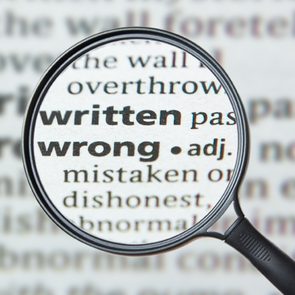Think funner isn’t a real word? You’re not alone, but the truth is more complicated.

Is “Funner” a Word? Let’s Settle the Debate

Mispronouncing a word is a guaranteed head-turner; just ask anyone who’s ever ordered a bowl of quinoa at a restaurant. But those “did-they-just-say-that?” looks aren’t just reserved for slip-ups in pronunciation. Grammar goofs can earn them too. And let’s be honest, no one nails every rule all the time. We’ve all stumbled. One case in point that trips people up more often than you’d think: funner. You’ve no doubt heard it dozens of times, but is funner a word?
Instead of second-guessing yourself forever, read on. We’re breaking down whether funner and funnest are actually words or just regularly repeated grammatical mistakes. Don’t worry—this ain’t English class. The primer ahead is easy to understand and (dare we say?) fun.
Get Reader’s Digest’s Read Up newsletter for more grammar tips, tech, travel, cleaning, humor and fun facts all week long.
How does funner relate to the word fun?
Before we get into whether funner is a word, you need to understand what the term has to do with fun. Both are degrees of comparison in English. You might not know what that is or understand the nuanced grammar rules behind it, but you’ve no doubt heard the different degrees of comparison in your everyday conversations.
Here’s a quick recap:
- Comparative degrees: When you want to compare something, you often add an -er to the end of the comparative adjective, turning cute to cuter, for instance. Think: “The kitten is cuter than the full-grown cat.”
- Superlative degree: To make it the superlative version, or the one that most exemplifies that adjective, add an -est. In this example, you’d turn cute to cutest à la: “That black-and-white kitten is the cutest one in the pet store.”
Of course, some adjectives don’t form superlatives this way. For instance, you wouldn’t say, “The twist was surprisinger in the book than it was in the movie.” You would say that it was more surprising. Adding more or most before an adjective is another way to make it comparative and superlative, respectively.
How do you know which to use?
The general rule is that one-syllable words get the suffix, and polysyllabic words get more or most. That is, unless the two-syllable word ends in a y; if that’s the case, you will add the suffixes and change the y to an i (think prettier and prettiest).
When it comes to the word fun, which has a single syllable, it shouldn’t be so hard to come up with its comparative version, right? Well, there’s more to the story. So is funner a word, and why does it sound so wrong? Keep reading to find out.
What is the superlative of fun?
You’d be surprised to know that all versions—which include funner and more fun as well as funnest and most fun—are accurate! But as with most things related to grammar, there’s more to it.
This simple adjective has only one syllable, so by that logic, adding a suffix to create a superlative makes sense. But if you were to say, “I think Magic Kingdom is a funner park than Epcot” or “Disney World was the funnest vacation ever!” you might get some strange looks. It sounds like a cute-because-it’s-wrong phrase a little kid would say.
But it’s also valid to question why we opt for more fun as the comparative, especially considering that the word funny, which has more syllables than fun, uses the suffixes without any problem (or funny looks from people). Well, the answer has to do with the origin of the word fun.
Fun as a noun

All the confusion comes from the fact that the word fun was not originally an adjective. According to Merriam-Webster, fun was mostly a noun until the early 19th century. Throughout the 1700s, it meant “amusement,” though before that, it surprisingly referred to trickery or deception. But as early as the 1800s, people began using it as an adjective, the way we’d describe “a fun time” or “a fun place” today.
And as they are known to do when people use words wrong, grammar experts freaked out. They decried this usage, one professor saying that hearing the adjective version of fun “[induced] severe nausea” in him, according to Merriam-Webster. But obviously, that didn’t stop people from using fun as an adjective, which eventually brought up the question of its comparative and superlative forms.
Fun as an adjective
Language is still evolving. Grammarians have mostly come around to the use of fun as an adjective (though some dictionaries still call it informal), but the comparative and superlative forms are a bit more wishy-washy. Surrounding this debate, there was (and remains) a sense of “Fine, you can use fun as an adjective, but it’s not really one, so it can’t follow the rules of real adjectives.”
Somehow, thanks to the weird machinations of language, that mentality helped popularize more fun and most fun in place of funner and funnest.
Is funner a word, then?
If you’re thinking that the adjective-but-not-really logic is downright silly, most dictionary establishments agree with you. And they also agree that the answer to “is funner a word?” is yes.
According to Merriam-Webster, if you consider the adjective fun a word, then funner is indeed a word, as is funnest, per normal rules of adjective formation. But this doesn’t mean that more fun and most fun are incorrect; in fact, in formal writing, you’ll probably still want to use those instead of funner and funnest.
The bottom line? The English language is chock-full of confusing grammar rules; there’s no need to insist that a word break the common rules of language just because we didn’t use it in a way we do now. So go ahead and have the funnest time debating the right superlative of fun with your word wizard friends.
Why trust us
At Reader’s Digest, we’re committed to producing high-quality content by writers with expertise and experience in their field in consultation with relevant, qualified experts. We rely on reputable primary sources, including government and professional organizations and academic institutions as well as our writers’ personal experiences where appropriate. We verify all facts and data, back them with credible sourcing and revisit them over time to ensure they remain accurate and up to date. Read more about our team, our contributors and our editorial policies.
Sources:
- British Council: “Comparative and superlative adjectives”
- Merriam-Webster: “Fun! Funner!! Funnest!!!”
- Merriam-Webster: “Funner, Stupider, and Other Words That Are in Fact Real”























